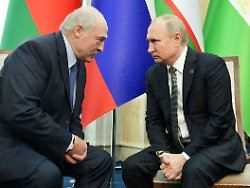Tuesday, November 9th, 2021
Kremlin chief consults with Lukashenko
Poland’s military presence calls Putin on the scene
Poland is also gathering regular military on the border with Belarus. The rulers in Minsk and Moscow have expressed concern and warned against acts of war. Meanwhile, the Polish President reports that the situation is under control. Warsaw does not need NATO assistance at the moment.
Belarusian President Alexander Lukashenko held consultations with Russian President Vladimir Putin against the background of the dispute over refugees at his country’s EU border. The presidents had “exchanged their opinions on the situation with the refugees,” said the Kremlin. Lukashenko’s office said both heads of state shared “special concern about the stationing of regular Polish troops on the border”.
The situation on the Belarusian border with Poland had recently worsened significantly. For weeks now, thousands of people have been arriving from Belarus, mainly from the Middle East, to get into the EU. The EU accuses Lukashenko of deliberately bringing people there and also suspects that Russia is involved. The Belarusian government rejected the allegations and warned Poland against “illegal acts of war” against the refugees.
Poland responded by massively increasing the number of its border guards, erecting a barbed wire fence and imposing a state of emergency in the border area. So-called pushbacks have also been legalized, with which an asylum application is prevented. The Russian government said it is monitoring the situation on the EU’s eastern border “very closely”. “It is a real problem that affects Belarus and Poland. We are of course very concerned,” said Putin’s spokesman Dmitry Peskov.
Perfidious means
Lukashenko has been at the helm of Belarus for 27 years. Neither mass protests such as those following the election in the summer of 2020, which was overshadowed by massive allegations of manipulation, nor an increasingly long list of sanctions from Brussels and Washington have so far been able to put the autocratic head of state in Minsk in their place.
Instead, according to Western governments, the 67-year-old is taking revenge with perfidious means – especially against the EU. Lukashenko is accused of deliberately smuggling refugees from the Middle East and Africa into the EU across the borders of Poland, Lithuania and Latvia. He wanted to retaliate in this way for European sanctions, which are directed against human rights violations in Belarus, is the allegation. Chancellor Angela Merkel accused Lukashenko of “trafficking in human beings” in refugees at the EU summit at the end of October. In the German-Polish border area alone, 8,833 refugees have already been picked up this year, as the Presidium of the Federal Police Potsdam announced on Monday. Up to and including Sunday, the police registered 992 unauthorized entries with a connection to Belarus in the first week of November. The number is rising steadily, according to the federal government.
Duda: Belarus is blocking refugees in the border area
Poland’s President Andrzej Duda raised serious allegations against Belarus in view of the tense situation in the border area. The migrants at the border would be blocked by the Belarusian side so that they could not leave the area, said the Polish head of state. The Belarusian regime is attacking the border of Poland and the EU in an “unprecedented way” by de facto inviting migrants into the country and pushing them to the Polish-Belarusian border, Duda said.
A spokesman for the Polish government announced on Monday that 3,000 to 4,000 migrants had gathered near the Polish border. Many of them want to go to Germany. The migrants tried in vain to break through the fence near the Kuznica border crossing, which has now been closed. According to Duda, there were several thousand people – mostly young men – who were obviously being controlled by the Belarusian side. The migrants were led from the road into the forest so that they could attack the border at a point without a border crossing, said Duda, who cited video material.
The situation on the Polish-Belarusian border is currently under control, assured Duda. Accordingly, there were sufficient border guards, soldiers and police on site. Support from NATO is not initially necessary, said Duda, who stated that he was in constant contact with NATO Secretary General Jens Stoltenberg in this regard.
